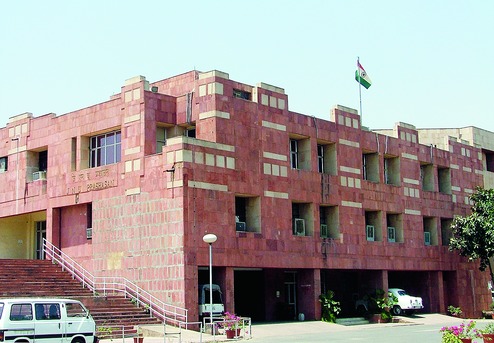
New Delhi: A JNU-approved agenda note to set up a National Security Studies Centre, where "Islamic terrorism" is one of the proposed courses, says "if you want peace, prepare for war".
The campus, known for its culture of promoting debate and dissent, is now witnessing a war of words among a section of teachers since the JNU Academic Council approved the proposal listing 21 key areas on which courses could be started, including "Islamic terrorism" and "demographic changes and national security".
"How can religion be associated with terrorism? Sociologically, the fundamentals of any religion - theology or rituals - do not teach violence," said Vivek Kumar, a professor of sociology at the School of Social Sciences in JNU.
He said "Islamic terrorism" was a western coinage after 9/11.
"The Quran and the Hadith do not speak about violence. They speak about resisting violence. We should not fall into the western construction," Kumar said. He also disapproved of the proposed course titled "demographic changes and national security".
There is a debate among a section of the population that the high population growth rate among Muslims was creating a demographic imbalance.
"The highest birth rate in India is among tribals, then villagers and then Muslims. There is a theory that with prosperity, the fertility rate declines. The premise is faulty in these two courses. When the premise is faulty, knowledge production will be faulty, which will not be conducive for policy formulation," Kumar said.
Another senior faculty member alleged that the phrases "Islamic terrorism" and "demographic change" were often used by the RSS-BJP to "malign Muslims".
"National security is taught in various courses at the (JNU's) School of International Studies. What is the need for these courses? Has it been done to please the BJP government?" he said, requesting anonymity.
"If Islamic terrorism can be a title, why should there not be a course on Hindu terrorism?" he asked.
He said the title "Islamic terrorism" had broken the principle of liberalism in a liberal university. "Terrorism has no religion," he said.
Objections had been raised to the title "Islamic terrorism" at the JNU Academic Council meeting last week where the proposal to set up a National Security Studies Centre was discussed.
Source said the dean of the School of International Studies, Prof Ajay Patnaik, had opposed the move, saying the title might trigger a demand for courses in "Hindu or Hindutva terrorism".
According to the sources, Patnaik suggested the title "religious radicalisation" instead of "Islamic terrorism" and "immigration/migration and its impact" instead of "demographic change".
JNU vice-chancellor M. Jagadesh Kumar said at the meeting on May 18 that all suggestions would be sent to the committee studying the proposal to set up the National Security Studies Centre.
Academic Council member Aswini Mohapatra, a professor at the School of International Studies and an expert on West Asia, argued in favour of the course but suggested tweaking the title to "Islamist terrorism".
He said: "The title of the course should be 'Islamist terrorism'. Islamist refers to those who use Islam as an instrument to mobilise (people) for political objectives like an Islamist state. When Muslim scholars have begun to recognise Islamist terror as a problem, why should we be over-sensitive?"
Mohapatra said the title "Islamist terrorism" would not trigger a demand for courses on "Hindutva terrorism".
"Terrorism is organised violence to capture state power or achieve secession or independence. It does not say overtly that it wants to achieve any of these. Theoretically, the Bajrang Dal is not a terrorist organisation. The Bajrang Dal variety of violence may be branded as a retaliatory or vigilante form of violence, which is equally condemnable," Mohapatra said.
Emails and calls to VC Kumar and rector Chintamani Mohapatra went unanswered.
The agenda note also mentions Maoism, cyber security, insurgency, maritime security and the military modernisation of China and Pakistan as key areas where courses could be offered.
According to the proposal, the National Security Studies Centre will strive to promote dynamic interactive learning to create knowledge on issues such as cyber security, terrorism, organised crime and arms smuggling.










